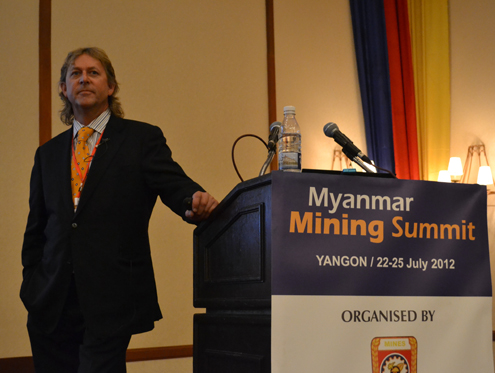International mining companies flocked to Rangoon this week to scope out opportunities in the resource-rich country’s untapped minerals sector during the first Myanmar Mining Summit.
As the impoverished nation emerges from over half a century of military rule and western countries have eased trade and investment sanctions, foreign investors have been flocking to the dilapidated economic capital of Rangoon to seek their fortune in the country.
But Burma’s restrictive regulatory framework, including an export ban on raw ore and select mineral commodities such as gold and coal, an inhibitive Production Sharing Contract (PSC) arrangement combined with a lack of legal and physical infrastructure, means many interested companies will be adopting a “wait and see” approach.
One of the major bones of contention involves the 30-70 profit sharing ratio, stipulated under the country’s 1994 mining law, between a foreign company and the Burmese government, which does not act as an equity partner but takes a hefty percentage of the total resource extracted on top of royalties and income tax.
“That means you risk all the money, you risk all the development then you give the government a share of the production free of charge, on top of royalty,” said Stephen Everett, an Australian investor interested in Burma’s gold and copper opportunities.
“People will not invest on that basis – not on a large-scale, anyway,” he said.
Investors and experts pointed to many grey areas in the legal framework, saying law and practice are two different games in Burma, with some government officials explaining everything was open to negotiation.
“Foreign investors can negotiate the Production Sharing Ratio (PSR) with the relevant mining department,” said Daw Ma Thu Za, an expert on foreign investment from the Myanmar Directorate of Investment and Company Administration (DICA).
“Everything seems negotiable – but no one’s going to sign that deal – it’s just not profitable,” said one western Australian investor who asked not to be named, adding companies would prefer to try their luck in countries with more attractive legal framework such as Indonesia or the Philippines.
Other sticking points included prohibitions on the export of raw ores, trading restrictions and the bureaucratic hurdle involved in negotiating the rights to an exploration permit from the Burmese government.
While the country’s untapped mineral wealth coupled with the absence of geophysical data and out-dated geological surveys could tempt eager exploration firms to rise to the challenge, investors will most likely wait for more attractive legislation, including the release of the long-anticipated Foreign Direct Investment (FDI) law and updated mining law.
While Burma’s current mining framework might not be inviting to big investors, Richard Taylor, general manager of Melbourne-based boutique firm Five Corners Consulting and a speaker at the conference, said small to medium firms were well-placed to make the first move and test the waters in Burma’s mineral sector.
“The junior exploration plays a very significant role in stimulating the interest in getting the high-risk exploration activity underway within a country and it is these people which we will see larger companies follow,” said Taylor.
“They are going in at a point where the mining law is in its infancy and down the track if Burma pursues an attractive and open mining system you will see larger companies taking part in a very promising country.”
Australians Stephen Everett and John Bovard said it was their first time in the country and were in attendance at the mining conference to explore opportunities in gold and copper operations in Burma.
Everett, chairman of exploration company Global Resources Corporation Limited, and Bovard, principal of Sterling Mining Group, said smaller Australian exploration and mining firms were well placed to enter Burma.
“Australian entrepreneurial junior companies are often the first movers going into remote areas,” said Everett, pointing to examples of South America, Africa and parts of Asia.
“We have a significant track record in terms of being ahead of the game in terms of exploration processing.”
The lack of large multinational mining firms active in Burma makes it an ideal location for small-scale mining firms to invest in the country’s unexploited mineral deposits, said mining experts.
One Canadian firm applied in June for a licence to explore for gold deposits in the country’s remote central region and says it’s “very optimistic” their permit will be granted by the government.
“Burma will have an explosion of discovery, just like Canada did,” said Jon North, president and chief executive officer of Canadian firm Northquest.
According to the North, Burma had undertaken small-scale exploration in the past but previously lacked the modern technology necessary to identify rich mineral deposits.
The country has great potential for gold mining he said, and foreign investors could bring in the needed capital and technological expertise.
The more than 300 delegates from over 25 countries in attendance, who paid about US$2,600 for an individual ticket to attend the three-day conference, reflected the vast levels of interest in the reforming country’s untapped minerals sector.
However, Burma’s current restrictive legal framework means many companies may hold onto their cash and wait for a more attractive investment environment to develop.
-Kate Kelly is a pseudonym for a journalist working inside Burma.



